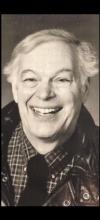[In this article Professor Joseph Butwin remembers with touching eloquence his friend, Professor Emeritus Robert Shulman. You can also view Dr. Shulman’s Seattle Times obituary and, if you wish, share your own memories and condolences on that platform; please click this link – Ed.]
Robert Shulman retired from the English Department in 2007 after forty-five years of service to the University of Washington. He died this past October. Bob was an undergraduate, close to home, at Syracuse University (BA, 1952). He then moved westward from Syracuse to Ohio State (PhD, 1959) to the other UW—Wisconsin—for a few years before landing in Seattle. Bob taught and wrote as a scholar of American Literature, more properly of American Studies, that conjunction of politics, literature, and culture which in Seattle began with the publication of V. L. Parrington's Main Currents in American Thought (1927). Parrington's name adorned—and adorns—the building which housed the English Department when Bob arrived in 1961.
Bob Shulman may not have been reading much Parrington when he did the journeywork that would lead to his two fine books on American literature and culture of the 19th and 20th centuries, Social Criticism and Nineteenth-Century American Fictions (1987) and The Power of Political Art: The 1930s Literary Left Reconsidered (2000). His own early influence in the pursuit of American Studies came from his advisor at Ohio State, Roy Harvey Pearce, and from other pioneers in the field at that time such as F. O. Matthiessen, Henry Nash Smith, and Leo Marx. But he may have been directed by Parrington, their predecessor, to an even earlier model—George Santayana whose Genteel Tradition in American Philosophy (1911) is a point of departure for Main Currents and for “The Conjure Woman: Double Consciousness and the Genteel Tradition,” an early chapter on Charles Chesnutt in Social Criticism. Bob, in his own time, would bristle at various later manifestations of that “genteel tradition,” and it is no wonder that many of his literary heroes tended to find their spiritual equivalent behind bars. “The Artist in the Slammer: Hawthorne, Melville, Poe, and the Prison of Their Times,” which I take to be the corner-stone of Social Criticism, makes this point superbly.
When Bob Shulman turned his attention to the twentieth century in his next book, he found his home and his voice in the combative literature of the left in the 1930s. The Power of Political Art is a vigorous reclamation of writers, including feminists and Communists, whose voices were largely squelched around the time that Bob would have begun to study American literature in the late 1940s and ‘50s when much (but not all) of academic America averted its eyes from the victims of the blacklists and purgations that we associate with the McCarthyism. I should say that my own fascination with Bob’s work on The Power of Political Art began with a reading in manuscript of its central chapter, “The Radical Art of Meridel LeSueur,” for Meridel was a great friend of my parents. I knew her well from the time when she turned, under the rude discipline of the blacklist, to writing children’s literature (and I was a child) down to her death in 1996 at the age of 96. In this and in other chapters on Josephine Herbst, Richard Wright, Muriel Rukeyser, and Langston Hughes, Bob recreates the political milieu and performs the close reading that these artists were largely denied in their lifetime.
All of this might suggest a rather solemn project for Bob Shulman, bristling at gentlefolks, redeeming outlaws; but the man who animated this life-long task was remarkably cheerful. Always warm and generous with his students, he was utterly, visibly, and audibly in love with his wife Sandy, their children Natasha and David, David’s wife Smadar and their daughter Talia. I say “audibly in love” with reason. If Bob’s hero Walt Whitman could “hear America singing,” I can hear Bob Shulman laughing. Years ago at a time when I was particularly glum about my own writing, I went to Bob for counsel. He patiently laid out a program—do this, do that over the next nine months, he said. He must have seen that I was daunted. He snapped his fingers, laughed, and added, “And you might have fun.” I wrote those words at the top of my own notes and did as I was told. --- Joe Butwin
